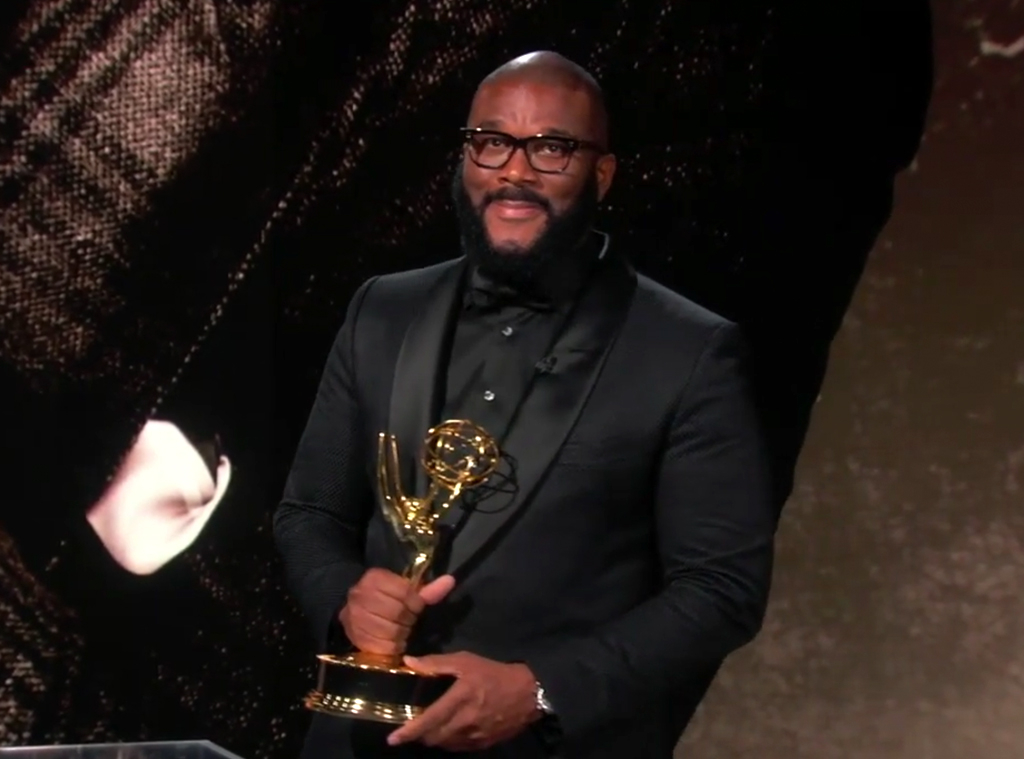 ABC
ABC
“Of course Hollywood welcomed an independent Black man with open arms. Wait, I misread that… He did it all by himself.”
So cracked Chris Rock, heard narrating but not seen at the 2020 Emmys tonight, as he and Oprah Winfrey co-presented trailblazing filmmaker and producer Tyler Perry with the Governor’s Award, an honor the Academy doesn’t bestow every year because, well…
Not everyone is Tyler Perry.
“In life we’re given no guarantees,” Winfrey, a longtime friend of Perry’s, said via video in a pre-taped segment. “In our journeys, we face roadblocks and bumpy roads, and it takes extraordinary grit and dedication to navigate the rough terrain often life can give you and still have the international fortitude to believe in yourself. My friend Tyler Perry has done just that, against all odds. He is a man of deep faith, he is a visionary who is led by unwavering passion, and a businessman who bet on himself, and by doing so, showed the world that there’s a different path to ultimate success.”
Rock spoke of how Perry ended up living in his car (not great, since the prolific film and TV mogul is 6-foot-5) after his first play flopped. Winfrey said, “Living like that can be a mighty motivator, and a motivated Tyler Perry would soon find success on his own terms.”
Also against all odds, Perry was one of the handful of A-listers who actually appeared in the flesh on Sunday at the 2020 Emmy Awards, toting his preemptively Clorox-wiped award with him to the stage at Staples Center.
“This is amazing,” Perry said after thanking the Academy. “I didn’t expect to feel this way.” (So emotional, he presumably meant.)
He continued, “When I was about 19, I left home and my grandmother gave me a quilt that she had made. And this quilt was something that I didn’t really care for. It had all these different colors and these different patches in it, and I quite was embarrassed by it. I had no value in it at all. When the dog got wet, I dried him off with it. When I needed to change the oil in the car, I laid it on the ground. I had no respect for this quilt.
“Many years later, as I was walking past a fancy antique store that I could finally go in and shop, I saw in the window a quilt that looked just like the one she had given me. And as I’m in the store wondering where this quilt was, an attendant walked up to me and said, ‘Let me tell you about this quilt. It was made by an African-American woman who was a former slave. Each patch in the quilt she had put in represented a part of her life. One was from the dress she was wearing when she found out she was free. Another part was from her wedding dress when she jumped the broom.”
And so he recounted the big wake-up call he received in that moment.
Zendaya’s Road to Emmys 2020
“And as I was hearing this story,” Perry went on, “I became so embarrassed. Here I was, a person who prides myself on celebrating our heritage, our culture—and I didn’t even recognize the value in my grandmother’s quilt. I dismissed her work and her story because it didn’t look like what I thought it should. Now, whether we know it or not, we are all sewing our own quilts—with our thoughts, our behaviors, our experiences and our memories. Like in my own quilt, one of my memories from when I was about 10 years old, I remember my father standing at the door and I was wondering why he stood there so long. He was frustrated and he walked away and I asked my mother what was going on.
“She said he had worked all week and he was waiting for the man to come and pay him and he never did. They needed the money at the time…She was so frustrated, she said, ‘Don’t you ever stand by a door waiting for white folks to do nothing for you.’ My mother wasn’t a racist. But in her quilt, she couldn’t imagine a world where her son was not waiting by the door for someone. In her quilt, she couldn’t imagine me actually building my own door and holding that door open for thousands of people. In my mother’s quilt, she couldn’t imagine me owning land that was once a confederate army base. Where confederate soldiers plotted and planned on how to keep Blacks enslaved.
“Now,” he said emphatically, “Black people, white people, gay, straight, lesbian, transgender, ex-cons, Latin, Asian—all of us come together, working, all coming together to add patches to a quilt that is as diverse as it can be, diversity at its best. I stand here tonight to say thank you to all of the people who are celebrating and know the value of every patch, and every story, and every color that makes up this quilt that is our business. This quilt that is our lives. This quilt that is America. Because in my grandmother’s quilt, there were no patches that represented Black people on television. But in my quilt, her grandson is being celebrated by the Television Academy. I thank you for this. God bless you. Thank you.”
